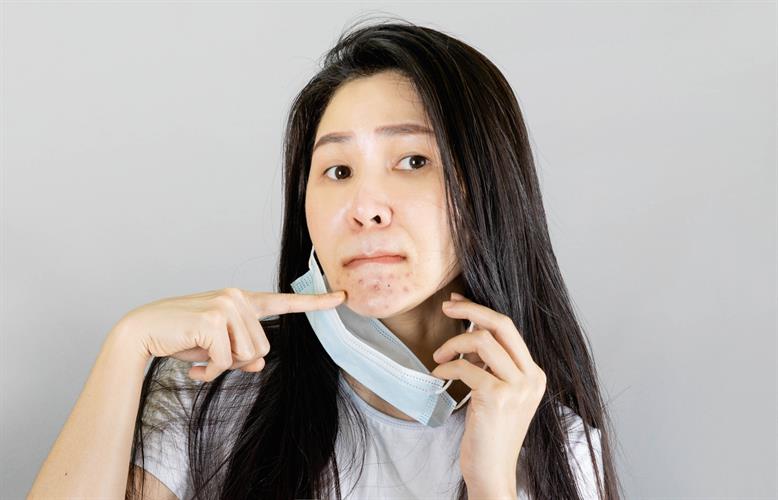
- 12 Aug, 2020
- /
- Category:
- Consumer Wellness
Treating and Preventing “Maskne” Breakouts with Skin Care Topicals
As a result of the COVID-19 pandemic, breakouts that occur from wearing a mask have become so common that the term "maskne" has gained popularity. Face masks can interfere with the skin’s natural shedding process throughout the day, leaving dead skin on the face and clogging pores. According to skin care professionals, the moisture-rich environment under a mask is ideal for the growth of bacteria and other organisms that can cause skin conditions to flare up. Coupled with pandemic-induced stress and the friction of fabric against the skin, dermatologists are seeing a rise in some forms of acne, especially “perioral dermatitis”, which typically occurs around the mouth and nose.1
Maskne is not a new concept. Known by healthcare professionals as “acne mechanica,” the condition is quite common among athletes who wear helmets or chin guards for their particular sport. Healthcare and other frontline workers are most at risk now for developing maskne because their masks are tighter fitting and they are wearing them for longer periods of time. A research letter published in the Journal of the American Academy of Dermatology reported that at least 83 percent of healthcare workers in multiple hospitals suffered skin problems on the face during the pandemic.2
Maskne can be treated much like regular breakouts. Over-the-counter acne-fighting ingredients like benzoyl peroxide (2.5 or 5 percent concentration) and salicylic acid help unclog pores effectively and can be used as a starting point for treatment. If you have black or brown skin and hyperpigmentation develops from the acne, dermatologists recommend a topical with glycolic acid, which can treat both blemishes and the darkening of the skin. For more severe cases, dermatologists may recommend anti-inflammatory cortisone creams or retinoid medications. If you are dealing with raw, red, inflamed areas of the skin - which mostly occur due to excessive mask wearing - both prescription and over-the-counter acne remedies can be irritating and counterproductive.
The good news is that maskne is preventable with regular mask hygiene. Here are a few tips experts recommend to minimize the chance of developing breakouts:
-Choose a mask that allows skin to breathe. Dermatologists recommend soft fabrics like cotton or silk vs. synthetic materials.
-Underneath the mask, use skin care and makeup products that are labeled non-comedogenic or oil-free to reduce the chance of breakouts.
-The mask will intensify product delivery to the skin, which accelerates production of acne and clogging of pores in the skin. Hence, dermatologists suggest avoiding applying makeup in the under-mask area entirely: specifically, heavy foundations and multiple product layers.
-Removing any makeup, dirt, oil and bacteria from the skin by washing the face once or twice daily with a mild cleanser is highly recommended.
-Avoid rubbing, picking and over-scrubbing your skin; exfoliating no more than once or twice a week.
-Moisturizers or broad spectrum SPF sunblock that contains zinc or titanium reinforce the skin and may serve as a barrier against mask friction and irritation.3
The Centers for Disease Control and Prevention recommend washing cloth masks after each use – and/or having multiple masks in rotation – which helps remove oils and dead skin that collect inside the mask.4 Use warm water and a gentle detergent that will not irritate the skin. With skin conditions such as rosacea or eczema, facemasks can provide added irritation and trigger symptoms so it is important to continue following a dermatologist’s recommendations.
It is also important to consider that a facial irritation may not be maskne. If it looks more like a rash, it may be contact dermatitis, which commonly comes from the metal or rubber parts of the masks and some fabrics. Hydrocortisone cream can help address this issue.
While maskne can be harmful and irritating, the benefits of mask-wearing far outweigh the related breakouts during this pandemic. Topical solutions formulated with the ideal active ingredients for various skin types can help keep peoples’ skin healthier and ultimately give them more comfort and confidence.
When looking to develop innovative, custom skin care formulas, Scapa Healthcare has the expertise and capabilities to provide you with the right formulations for moisturizers, skin cleansers and other topical solutions for your specific customer needs. Long-wear hydrocolloid patches are also an effective option for the treatment of mild to moderate acne, and will act as a second skin under the mask as they seal and protect the blemish from external contaminants and prevent the skin from drying out.
Learn more about our advanced formulation capabilities and reach out today for more information.
________________________________________________________________________
1 LaMotte, Sandee, CNN Health, ‘Maskne’: Why your face is breaking out under your mask and how to stop it”, June 25, 2020 https://www.cnn.com/2020/06/25/health/maskne-acne-covid-masks-wellness/index.html
2 Rubin, C., The New York Times, “Maskne is the New Acne, and Here’s What Is Causing It”, June 17, 2020 https://www.nytimes.com/article/maskne-acne.html
3 Cleveland Clinic Health Essentials, “The Struggle with Maskne is Very Real”, July 13, 2020 https://health.clevelandclinic.org/the-struggle-with-maskne-is-very-real/
4 Dave, A, Self, How to Prevent – and Treat – That Pesky Mask Acne, July 20, 2020 https://www.self.com/story/mask-acne
